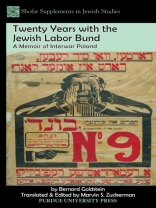Bernard Goldstein’s memoir describes a hard world of taverns, toughs, thieves, and prostitutes; of slaughterhouse workers, handcart porters, and wagon drivers; and of fist-and gunfights with everyone from anti-Semites and Communists to hostile police, which is to say that it depicts a totally different view of life in prewar Poland than the one usually portrayed. As such, the book offers a corrective view in the form of social history, one that commands attention and demands respect for the vitality and activism of the generation of Polish Jews so brutally annihilated by the barbarism of the Nazis. In Warsaw, a city with over 300, 000 Jews (one third of the population), Bernstein was the Jewish Labor Bund’s “enforcer, ” organizer, and head of their militia—the one who carried out daily, on-the-street organization of unions; the fighting off of Communists, Polish anti-Semitic hooligans, and antagonistic police; marshaling and protecting demonstrations; and even settling family disputes, some of them arising from the new secular, socialist culture being fostered by the Bund. Goldstein’s is a portrait of tough Jews willing to do battle—worldly, modern individuals dedicated to their folk culture and the survival of their people. It delivers an unparalleled street-level view of vibrant Jewish life in Poland between the wars: of Jewish masses entering modern life, of Jewish workers fighting for their rights, of optimism, of greater assertiveness and self-confidence, of armed combat, and even of scenes depicting the seamy, semi-criminal elements. It provides a representation of life in Poland before the great catastrophe of World War II, a life of flowering literary activity, secular political journalism, successful political struggle, immersion in modern politics, fights for worker rights and benefits, a strong social-democratic labor movement, creation of a secular school system in Yiddish, and a youth movement that later provided the heroic fighters for the courageous Warsaw Ghetto Uprising.
Spis treści
Foreword
Translator’s Preface
Acknowledgments
Bernard Goldstein: A Chronology
Translator’s Note
Original Introduction by Dr. Emanuel Sherer, General Secretary of the Jewish Labor Bund
1. I Go Home
2. Back in Warsaw
3. Praga
4. The Seven Lions
5. The First of May Demonstration in Praga, 1920
6. Pogrom at the Praga Bund Club
7. Janek Jankelewicz
8. The Cracow Convention
9. A Hail of Persecutions
10. Illegal Work—Once Again
11. The Danzig Convention
12. Coming to the Defense of the Movement
13. Organizing the Bund Militia
14. The Communists and the Underworld
15. The 1922 Election Campaign
16. Unifying the Trade Union Movement
17. The Slaughterers Union
18. Three Slaughterer Dynasties
19. The Transport Workers Union: Back Porters
20. Back Porter Types
21. Rope and Handcart Porters
22. The Food Workers Union
23. The Bakers Union
24. Bagel Bakers and Peddlers
25. A Day in a Slaughter House
26. Jewish and Polish Meat Workers
27. At Parties and Celebrations
28. Resistance: The First of May Demonstration, 1923
29. Struggles over the Saturday Edition of the
Folkstsaytung
30. Commissar Cechnowski
31. Kalmen the Bootmaker’s Death
32. The Piłsudski Coup, the PPS, and the FRACs
33. The FRAC Militia
34. A New Gang of Communist Strong-Arms
35. Communists Shoot at a Workers Convention
36.
Morgnshtern
37. The Labor Sports Olympiad in Prague
38. Ominous Dark Clouds on All Sides
39. Concerns about Self-Defense
40. A Wave of Wildcat Strikes
41. An Attempted Murderous Assault on Me
42. In Zakopane
43. Attacks on a Night School
44. The Medem Sanitarium Attacked
45. Another Attempt on My Life
46. Krochmalna Street
47. Fat Yosl
48. Khaskele
49. “Malematke”
50. Yukele
51. Troubles with Cultural Awakening
52. The Militia Comes to the Aid of Bundist Members on the Warsaw City Council
53. First of May Demonstrations Under the Piłsudski Regime
54. A Joint First of May Demonstration with the PPS
55. In Red Vienna
56. Street Fights with the Polish Hitlerites
57. Battles over the Boycotting of Jewish Businesses
58. The “Ghetto Benches” in the Universities
59. My Son at the SKIF Camp
60. The Bakers Union Turns Away from the Communists; The Murder of Neuerman
61. Nathan (Nokhem) Chanin’s Visit to Warsaw
62. Three Bloody Attacks in One Day
63. Temptations and Doubts
64. Shloyme Mendelson
65. In the Trap of the Shetshke Gang
66. The FRACs Try to Take Over the Newspaper Deliverers Union
67. The FRAC Transport Workers Union and Itshe “Zbukh”
68. Returning Stolen Goods to a Leather Merchant
69. Among the Retail Clerks; Another Worker Murdered
70. Auctioning off the
Folkstsaytung
71. A Defeat for the Priest, Father Trzeciak
72. Przytyk and the Protest-Strike on March 17, 1936
73. The Pogrom in Minsk-Mazowiecki
74. Antisemitic Hooligans Kill a Jewish Child during a First of May Demonstration
75.
Oenerowcy Leaders Are Taught a Lesson
76. Guarding the
Folkstsaytung
77. The Pogrom in Brisk
78. The Bund’s Warsaw Locales
79. A Bombing of the Bund Offices—And Our Answer to the
Oenerowcy
80. An
Oenerowcy Attempt to Murder Comrade Henryk Erlich
81. December 18, 1938
82. A Final Look at Our Youth
Glossary of Terms, Names, and Acronyms
References
Index
O autorze
Bernard Goldstein dedicated his life to the Jewish labor movement in Poland. An ordinary worker, he rose to a position of prominence in the Jewish Labor Bund, the premier political representative of the Jewish working class in pre-WW II Poland. His life and work were intimately entwined with the Bund. He was its chief trade union organizer in Warsaw, and its militia organizer and commander. He wrote two books, this one and The Stars Bear Witness.
Marvin S. Zuckerman has edited several volumes of Yiddish literature in English translation, has written college English textbooks, and has published articles in various periodicals, some in Yiddish and some in English. A retired professor of English, he served as chair of the English Department for fifteen years at Los Angeles Valley College and as dean of Instruction for six years, before retiring in 2002. He is the son of Yiddish-speaking Bundists from Warsaw, Poland.












